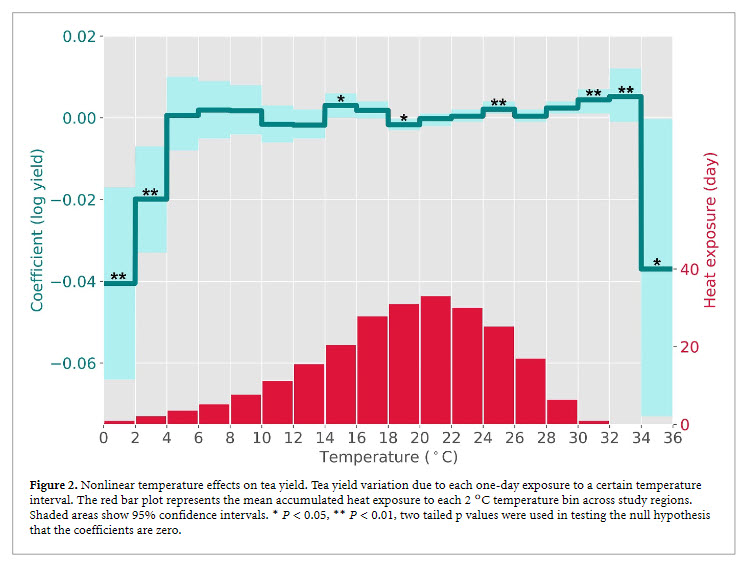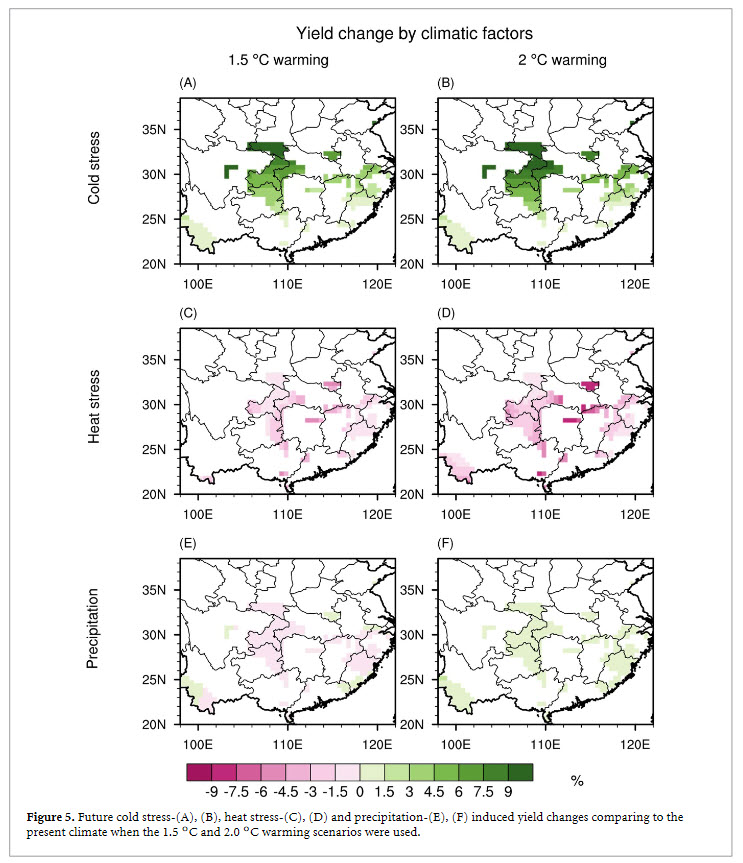Hear the Headlines
| Research Reveals That Children Benefit from Drinking Tea
| A New Definition for Specialty Tea Gets Refined
| Unilever’s Tea Brand Divestiture is on Pace
In a significant development this week, the Tea Board of India issued a circular making it mandatory for producers to send at least 50% of their produce to the public auction. Producers that fail to comply face action. Expectedly, producers are not happy. Read more…
Features
Tea Biz this week visits the tea lands from on high where rising temperatures in the atmosphere are causing shifts in the jet stream that alter ocean temperatures, causing an unusual period of extreme weather globally. The results from changes in the climate are visible this summer as heat domes, and drought, slow-moving monsoons and violent typhoons and fast-melting glaciers in the Himalayas….
… then to England to marvel at the work of British author and photographer Michael Freeman and co-author Timothy d’Offay whose large-format book The Life of Tea: A Journey to the World’s Finest Teas gets a glowing review from Tea Book Club founder Kyle Whittington.

Children Benefit from Drinking Tea
By Dan Bolton
An extensive review of medical research suggests children as early as age 4 benefit from drinking tea.
In a peer-reviewed paper published in the Nutrition and Food Technology journal, Dr. Pamela Mason identified 60 scientific studies on the health benefits of drinking tea from childhood onward, as reported in The Telegraph of London. Drinking three cups of black tea daily improves cardiovascular health and boosts the body’s immune system, she said.
Tea also helps combat obesity, stress, aids relaxation, influences brain functions such as alertness and concentration, and is an ideal replacement for sugary drinks.
Drinking tea daily “could help preserve physical and mental health in childhood, through the teens and adulthood, pregnancy and into old age,” she said.
Biz Insight – The research, commissioned by the UK’s Tea Advisory Panel, showed that clinical and laboratory studies demonstrate how phenolic compounds in green tea boost nitric oxide levels which lowers blood pressure, and act as antioxidants to reduce inflammation. Tea polyphenols also limit cholesterol absorption in the gut and target receptors which regulate blood cholesterol levels.
Citation: Mason P, Bond T (2021) Tea and Wellness throughout Life. Nutr Food Technol Open Access 7(1): dx.doi.org/10.16966/2470- 6086.172

Visual Splendor
By Kyle Whittington | Tea Book Club
One of the lovely things about this book is that you don’t feel that you’re rereading information on tea that you’ve read 1,000 times before. Rather, you go on a journey to each tea type, each country, region, artisan or tea house, and along the way, dotted throughout the text like so many villages amongst the tea mountains are these wonderful gems and nuggets of information. There’s so much to learn and absorb both from the pictures and the text in this book. It sits such at an unusual sweet spot where a visually enticing book meets a well-researched and written reference book. Read more…

Listen to this report
Tea Threatened by Intemperate Torture
By Dan Bolton
The howl of Typhoon In-Fa assailing China, and the monsoons deluging India brought havoc, not relief to parched tea lands this month.
Record rainfalls in central China’s Henan Province forced the evacuation of 1 million people and swamped or swept away cultivars used to make Xin Yang Mao Jian, a prized green tea. Tea retailers Heytea and Nayuki pledged a combined $1.5 million to a local charity in Zhengzhou for flood control and disaster relief.
In India, super-heated air from a heat wave that killed thousands — now heavily laden with moisture — traveled north causing flooding. Chiplun in Maharashtra, received 450mm (17.7 inches) of rainfall in a single day on July 22. For comparison, the highest single-day rainfall recorded in the capital, New Delhi, in the last 15 years was 144mm (5.7 inches) in 2016, writes Al Jazeera.
The Himalayas have been warming for years. Melting ice trapped in 15,000 glaciers is receding at 100 to 200 feet per year, saturating the soil, contributing to landslides and the destruction of two dams in February that killed 200. In Nepal entire villages have been forced to migrate to lower lands to avoid once frozen, now flowing glacial lakes.
Consider for a moment the leaves that sustain the tea industry.
Currently the soil under their feet is either soggy and unstable or dry and unyielding. Tea is heat-tolerant up to a point, but growth of new leaves stops at 95o Fahrenheit | 35o centigrade. Insect infestations such as the red mite are now more common. Fungal and bacteria borne diseases are harder for the plants to combat. Leaves of clonal tea bushes cascade to the ground at temperatures above 40o centigrade. Without rain, cells at the core of the trunk contract, no longer able to transport water from the soil. Branches turn brittle, death quickly follows.
Now, consider China, the world’s largest tea producer.
In the immediate future leaves basking in the sun benefit, especially in the northern regions where long winters and frost limit yields.
In a March 2021 article in the journal Environmental Research Letters, researchers conclude that both heat and cold extremes were associated with significantly reduced tea yields.

“In the present climate, dominating cold extremes influence more than half of China’s tea production, with a maximum of 56% reduced annual production… Climate warming may diminish the negative impacts of cold extremes, they write. However, reduced yields in regions subject to intensified heat extremes will emerge. In the colder regions dry roots withstand frost better than wet — but sustained heat is fatal. In a country that produces billions of kilos of tea, losses are estimated from 14%–26% at the Yangtze River and in southern China regions.
The authors write that “Increasing heat extremes pose the most challenging changes for tea production in China. We expect up to 11%–24% heat-induced yield loss in Chongqing, Hunan, Anhui, and Zhejiang.
China accounts for 41% of global production, India contributes 21% and Kenya 8%. All three are impacted. A decline in yield of this magnitude would make quality tea scarce and while quantities will be sufficient to meet domestic needs little will be left for export. A quality declines, consumer tastes will shift to competing beverages.
Tea is one of the most important cash crops in developing countries, and as a result — tea cultivation is of considerable socio-economic importance for the alleviation of rural poverty. In China, about 80 million people are employed in the production of tea. Smallholders who contribute more than half the volume of tea grown in India and Kenya will be unable to irrigate or relocate to higher, cooler elevations. The World Bank has warned that climate change could sharply diminish living conditions for up to 800 million of those living in South Asia.

Effects of Extreme Temperature on China’s Tea Production
Citation: Yulin Yan1, Sujong Jeong7,2, Chang-Eui Park2, Nathaniel D Mueller 3,4, Shilong Piao5, Hoonyoung Park2, Jaewon Joo2, Xing Chen2, Xuhui Wang5, Junguo Liu6Show full author list Published 30 March 2021 • © 2021 The Author(s). Published by IOP Publishing Ltd Environmental Research Letters, Volume 16, Number 4 Citation Yulin Yan et al 2021 Environ. Res. Lett. 16 044040
Speciality Tea Definition Refined
By Dan Bolton
Tea Associations in the US, Europe, and Canada responded this week with concerns about the European Speciality Tea Association’s definition of specialty tea. The Tea & Herbal Association of Canada, the Tea Association of the USA, and Tea & Herbal Infusions Europe issued a joint statement expressing “concern” with the language ESTA used to differentiate specialty tea from traditional tea.
Criteria cited in the ESTA definition includes tea’s physical and sensory characteristics and a requirement that it be traceable through details such as location, pluck date, processing facility.
These are the same criteria used by every tea taster in the industry, regardless of “specialty” or “traditional” label, reads the joint press release.
The release points out that traceability is not unique to specialty teas, “Traceability requirements are at the core of food safety laws in place around the world and must be demonstrated as part of regular audits for large retailers as well as certification programs.”
Although all the above may be part of what defines specialty tea “suggesting they are not a part of “traditional” tea is factually incorrect,” reads the release.
In reply, David Veal, executive director of the European Speciality Tea Association writes that “We note the concerns about the language of differentiation between speciality and other teas, but that is the very point of defining speciality, to differentiate it, and so to further distinguish speciality tea from commodity tea we place emphasis on attaining tea excellence from bush to cup. Speciality tea can be defined by the quality of the criteria – not the use of the criteria. ESTA believes that the degree of excellence that a tea reaches in each of these criteria determines specialty versus commodity,” writes Veal.
The joint release states that the signatories “take great pride in our collective approach of inclusion… our members include all parts of the supply chain operating in what is commonly referred to as the “traditional” tea industry as well as the “speciality” tea industry.
Since the release of our definition, we have received very positive responses from small farmers and consumers… and we believe that we are moving in the right direction for the benefit of the speciality tea market, writes Veal.
“We welcome all feedback and hope to be able to continue discourse directly with all parties who are interested in promoting speciality tea,” he added.
Biz Insight – In an updated post on the Tea Biz blog, ESTA continues to refine its definition with an explanation by ESTA president Nigel Melican of the term hand-crafted and the role of machinery in making specialty tea.
Unilever Tea Brand Divestiture on Pace
During a July 22 earnings call Unilever CEO Alan W. Jope told investors that “the operational separation of our tea business is now substantially complete” but he did not offer a timeline for the divestiture.
He said the company has created “an attractive standalone business with dedicated leadership. We’re very pleased with the progress we’ve made on the complex separation… we’ve filled 3,500 vacancies around the world, we’ve established the sales organizations in our largest markets. We will start to engage externally very shortly to execute on outcome, and this could be through an IPO, through a sale, or partnership,”? said Jope.
The company intends to divest a sizeable portion of its tea business including the Tazo, Pukka Herbs and T2 brands.
– Dan Bolton
Upcoming Events
August 2021
Beijing International Tea Expo, Beijing China
August 27-30, 2021 | Beijing Exposition Center
Share this episode with your friends in tea.
https://teabiz.sounder.fm/episode/news-01212021
Subtext
Avoid the chaos of social media and start a conversation that matters. Subtext’s message-based platform lets you privately ask meaningful questions of the tea experts, academics and Tea Biz journalists reporting from the tea lands. You see their responses via SMS texts which are sent direct to your phone. Visit our website and subscribe to Subtext to instantly connect with the most connected people in tea.
Subscribe and receive Tea Biz weekly in your inbox.




